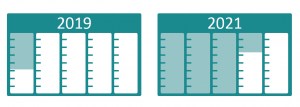Managing the new normal: How has working from home changed management strategies during the coronavirus pandemic?

The COVID-19 pandemic has taken companies into uncharted territory: everyone is working from home. Online meetings suddenly became the norm. But how do you manage a company when no one is on site and everything is digital? TRR 266 researchers Hoa Ho, Christian Hofmann and Nina Schwaiger from LMU Munich investigate this question. In their publication, published in Accounting and Business Research, they analyze how management controls, in particular action, result and cultural controls, have changed due to working from home during the COVID-19 pandemic. They also examine how these adjustments in management styles are related to the resilience of companies. The research findings emphasize that a balanced and adaptable management strategy is important to promote companies’ transparency and resilience in a changing work landscape.
It is spring 2020 and carnival is being celebrated in many German cities. Suddenly, the Covid-19 pandemic hits Germany. The first major outbreak was followed by a national lockdown: a retreat into the four walls of home. From one day to the next, many people start working from home. Companies equip their employees with laptops. Processes that were previously managed centrally in the office are now being decentralized. Where people used to sit together in an open-plan office, they now sit alone at their dining tables in front of their laptops. What used to be discussed at the coffee machine in the office now has to be written via chat programs and email or discussed via video conference. While employees get used to the new situation, managers also have to change their plans. For them, working from home also means a loss of transparency and thus control. While in the office it was easy to look over employees’ shoulders, new forms of control are now required. This is exactly where our study comes in:
What has changed since the start of the pandemic:
Between 2019 and 2021, employees spent considerably more time working from home:
Average hours spent working from home comparing 2019 to 2021:

Ø 4,84 hours per week Ø 26,66 hours per week
The shift to working from home has led to a drastic change in the way we work. A change for both employees and management: adjustments in the corporate management controls of many organizations have become necessary. But what exactly changed in companies? How did managers deal with the loss of transparency caused by working from home and what strategies did they develop? This is exactly what we investigate in our study. We focus on three forms of management controls: action controls, result controls and cultural controls.
New management strategy: less looking over the shoulder and more checking results – right?
Our results show that, surprisingly, action controls are used increasingly. This means that, where possible, processes are being standardized and employees are more actively integrated into the planning processes. At the same time, managers also rely more on result controls. For example, they are more than before looking at KPIs, although there is mixed evidence regarding the precision of result controls. In particular, it appears that managers are now more tolerant to deviate from targets. E.g. existing KPIs and employee targets are more likely to be adjusted and new KPIs introduced more frequently.
In addition, the Covid-19 pandemic severely restricted socialization within the company. There was less informal communication. This also led to adjustments in cultural controls and the need towards a transformational leadership style.
The long-term lack of effective cultural controls could in turn have detrimental effects. For example, employee loyalty to the company decreases. We therefore assume that an interplay between the different types of controls is important to ensure effective transparency in the company, regardless of the situation. Overall, our findings suggest that the Covid-19 pandemic has heightened managers’ awareness of the importance and role of management controls in managing crises.
|
Action Controls
By moving to working from home:
|
|
Result Controls
By moving to working from home:
|
|
Cultural Controls
By moving to working from home:
|
More resilient companies adapt their management controls less
However, we also observe that companies have reacted differently to the crisis – depending on their resilience. We define resilience as the ability of companies to recover from an exogenous shock. Resilience therefore covers both the resilience of companies, i.e. the extent to which company figures changed at the beginning of the crisis, and the ability to regenerate, i.e. how quickly companies recovered during the crisis. Less resilient companies are forced to change their management controls more strongly in order to be able to cope with the major changes caused by the crisis better. For more resilient companies, this means that they either already have appropriate management controls in place, or their business operations are not severely impacted and they can therefore continue to operate with their existing management controls.
Our results show that more resilient companies adapt their control mechanisms to a lesser extent than less resilient companies. This suggests that more resilient companies have experienced a smaller shock to transparency. For example, departments in less resilient companies had to overcome greater challenges in financial planning and performance measurement than similar departments in more resilient companies.
Resilient companies also show a significantly higher organizational trust base and rely on transformational leadership.
How can companies prepare for crises?
Our study shows that adapting management controls if necessary is important in times of crisis. There are two important recommendations for companies to navigate successfully through times of crisis:
- Companies can adapt their management controls in the short term to counteract control problems caused by a loss of transparency. In particular, deficits in one control element can be compensated for by another control element. For example, managers can compensate for the lack of monitoring of employees by (efficiently) adapting some management control practices relating to the actions and results of employees in the short term. So, by standardizing certain processes or relying more on Result Controls.
- Cultural controls, in particular trust in a company, proved to be an unforeseen plus during the crisis. Companies that were well positioned here did not have to introduce costly action controls to compensate for the lack of monitoring. However, organizational trust takes time to establish and requires long-term planning. Consequently, companies need to proactively and continuously invest in organizational trust to prepare for crises. One way to build organizational trust, for example, is to appoint transformational leaders who provide clear direction to employees and motivate them to be more engaged at work.
To cite this blog:
Ho, H., Hofmann, C., Schwaiger, N. (2024, January 3). Managing the new normal: How has working from home changed management strategies during the coronavirus pandemic?, TRR 266 Accounting for Transparency Blog. https://www.accounting-for-transparency.de/how-has-working-from-home-changed-management-strategies
More Information
Our study “The Covid-19 Pandemic and Management Controls” examines how companies adapted their management controls to the changes due to the pandemic and what correlations there were with a company’s resilience to the crisis. We first reviewed the literature on the impact of the pandemic on companies and then analyzed the results of a study that surveyed employees within a large, international multi-divisional service company. We also used data from the German Business Panel (GBP), which conducts a long-term study in which employees in German companies are regularly surveyed.
Responses